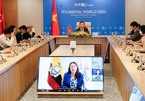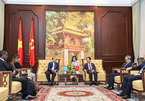While 4G and 5G are gradually becoming more popular, nearly 50% of the global population has not yet had access to the Internet. It is not easy for all countries to perform digital transformation because of the difference in access to the Internet and technology.
|
|
Access to low-cost technology was the topic of a discussion session of the ITU Ministerial Roundtable that took place on October 12-14, within the framework of the ITU Digital World hosted by Vietnam.
ICT Ministers and many experts of ITU member countries discussed the issue of setting appropriate costs to help accelerate digital transformation and the role of governments in removing barriers to Internet access digital transformation.
According to ITU’s data, more than 90% of the urban population and more than 70% of the rural population in the world have been covered with 4G networks, but nearly half of the global population have not accessed to the Internet yet.
Rashad Nabiyev, Minister of Transport, Communications and High Technology of Azerbaijan, said that the achievements in telecommunications technology and digitization have made it possible for people to use the Internet, study online, and get full information and sufficient data to overcome the pandemic. In Azerbaijan, almost 85% of the population have access to the Internet and 85% of households living in urban areas have access to broadband services but 70% of the accessible content is accessed through the outdated DSL technology.
The same thing occurs in many other countries. According to Ali Ibrahim Pantami, Nigeria's Minister of Communications and Digital Economy, in this country, the Internet plays an essential role, but only about 50% of the population has access to broadband.
Another problem is gender inequality in Internet access. Jean Philbert Nsengimana, President of the Internet Alliance, shared a remarkable statistic: Countries in the world have missed about $1 trillion in GDP over the past decade because women have not had full access to digital transformation. This inequality was revealed even more clearly during the Covid-19 pandemic.
Digital transformation has been discussed for years and it has become even more urgent during the pandemic, when many activities are disrupted. Therefore, all countries are focusing on solving the problem of increasing the percentage of people accessing the Internet and technology.
According to Boviengkham Vongdara, Minister of Information and Communications Technology of Laos, providing cheap Internet connection is an effective way to promote digital transformation and help people close the gap and connect with each other to overcome the pandemic. He also said that the Lao government has a subsidy program for people in remote and isolated areas and invests in infrastructure to be ready for digital transformation.
Sharing the same view, Admiral Tin Aung San, Minister of Transport and Communications of Myanmar, emphasized that cutting costs is the key to the success of digital transformation and the governments need to develop the right policies to promote integration of ICT and technology into economic sectors.
The government's role in digital transformation
Mr. Rashad Nabiyev from Azerbaijan believes that governments have an active role in digital transformation by providing the backbone of the Internet infrastructure because private companies often do not have enough power to finance digital transformation.
Paola Vega Castillo, Minister of Science, Technology and Telecommunications of Costa Rica, said that Costa Rica is developing a new national plan for telecommunications development over the next five years and in this process local governments are provided funding and they all create favorable conditions for private firms to invest in digital transformation and benefit from it. “Public-private partnership will bring about development," she emphasized.
So that people can benefit from the nearest cheap telecommunications charges in the area, Mr. Chea Vandeth, Minister of Posts and Telecommunications of Cambodia, said that the Cambodian government has strengthened telecommunications legalization and worked closely with mobile service providers to continuously invest in infrastructure and providing low-cost connections to people.
The key for Cambodia's digital transformation is to focus on developing public and private cooperation to promote connectivity; developing the quality of telecommunications services and customer services based on the newly promulgated legal framework; building flexible programs to develop the digital economy and digital transformation, and finally, promoting digital transformation skills at higher institutions.
ITU Deputy Secretary General Malcolm Johnson said that the difficulty lies in the ability to offer affordable connectivity to people in rural, remote and isolated areas. This problem can be solved through state funding, public-private partnerships, action programs and a flexible policy framework to support and encourage investment in rural areas that are lagging behind.
Duy Vu - Thanh Binh

ITU Digital World: broadband infrastructure helps reduce unemployment
The topic "Strengthening infrastructure development: The government’s role in digital transformation" was discussed by ministers and experts at the ITU Ministerial Roundtable’s discussion.

Technological autonomy the basis for Vietnam’s success
Minister of Information and Communications Nguyen Manh Hung has met with Secretary General of the International Telecommunications Union (ITU) Houlin Zhao, who is attending the ITU Digital World 2021 hosted by Vietnam.